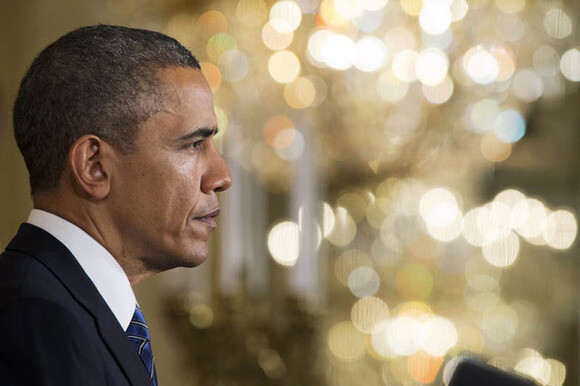hankyoreh
Links to other country sites 다른 나라 사이트 링크
Obama upholds Myanmar as an example for N. Korea

By Kang Tae-ho, senior staff writer
On Nov. 19, 2012, following his reelection as United States president, Barack Obama made a speech at Yanggon University, one of the most important sites in the democracy movement in Myanmar (also called Burma).
“To the leadership of North Korea, I have offered a choice: let go of your nuclear weapons and choose the path of peace and progress. If you do, you will find an extended hand from the United States of America,” Obama said during the speech.
In 2008, when Obama was running for president as the Democratic Party’s candidate, he criticized George Bush’s North Korea policy. Obama emphasized direct dialogue, saying that he would be willing to meet the leader of North Korea during his first year in office if he were to be elected.
And in 2009, Obama used his inaugural address to reach out to countries such as Venezuela and North Korea that had expressed opposition to the US. “We will extend a hand if you are willing to unclench your fist,” Obama said.
During his speech in Myanmar, Obama said, “Today, I’ve come to keep my promise and extend the hand of friendship.”
The implication is that if the leaders of North Korea abandon their nuclear weapons and choose the path of peace and prosperity, they could also normalize relations with the US.
During the joint press conference that he held with South Korean President Park Geun-hye following their May 7 summit, Obama said, “Our two nations are prepared to engage with North Korea diplomatically and, over time, build trust.” Once again, he referred to Myanmar in this context.
Obama is sending a message toward North Korea. If Pyongyang follows the example of Myanmar, Obama says, the US is willing to give up its hostile North Korea policy.
This stance was also articulated in a speech entitled “The United States and the Asia-Pacific in 2013,” which Thomas Donilon, the National Security Advisor for the White House, made at the Asia Society on Mar. 11.
Myanmar has moved forward on the path to democracy and reform in a wide range of areas, including the release of political prisoners and other human rights improvements. But it does not seem that Obama views North Korea and Myanmar in exactly the same way.
Of course, Obama is not ruling out the possibility that North Korea could implement reforms including democracy and protecting human rights. However, he is urging the North, as he puts it, to put the priority on “meaningful steps to abide by its commitments and obligations, particularly the denuclearization of the Korean Peninsula.”
Obama gave particular emphasis to “changes in behavior,” saying that “we haven’t seen actions on the part of the North Koreans that would indicate they’re prepared to move in a different direction.”
Along with this, Obama appeared to use the summit to send a message to North Korea that he would view a positive North Korea response to Park’s trust-building process for the Korean peninsula as one of the “meaningful steps” he has asked for.
Please direct questions or comments to [english@hani.co.kr]

Editorial・opinion
![[Guest essay] The real reason Korea’s new right wants to dub Rhee a founding father [Guest essay] The real reason Korea’s new right wants to dub Rhee a founding father](https://flexible.img.hani.co.kr/flexible/normal/500/300/imgdb/original/2024/0423/8317138574257878.jpg) [Guest essay] The real reason Korea’s new right wants to dub Rhee a founding father
[Guest essay] The real reason Korea’s new right wants to dub Rhee a founding father![[Column] ‘Choson’: Is it time we start referring to N. Korea in its own terms? [Column] ‘Choson’: Is it time we start referring to N. Korea in its own terms?](https://flexible.img.hani.co.kr/flexible/normal/500/300/imgdb/original/2024/0423/3617138579390322.jpg) [Column] ‘Choson’: Is it time we start referring to N. Korea in its own terms?
[Column] ‘Choson’: Is it time we start referring to N. Korea in its own terms?- [Editorial] Japan’s rewriting of history with Korea has gone too far
- [Column] The president’s questionable capacity for dialogue
- [Column] Are chaebol firms just pizza pies for families to divvy up as they please?
- [Column] Has Korea, too, crossed the Rubicon on China?
- [Correspondent’s column] In Japan’s alliance with US, echoes of its past alliances with UK
- [Editorial] Does Yoon think the Korean public is wrong?
- [Editorial] As it bolsters its alliance with US, Japan must be accountable for past
- [Guest essay] Amending the Constitution is Yoon’s key to leaving office in public’s good graces
Most viewed articles
- 1[Column] ‘Choson’: Is it time we start referring to N. Korea in its own terms?
- 2Why Korea shouldn’t welcome Japan’s newly beefed up defense cooperation with US
- 3Senior doctors cut hours, prepare to resign as government refuses to scrap medical reform plan
- 4[Guest essay] The real reason Korea’s new right wants to dub Rhee a founding father
- 5Opposition calls Yoon’s chief of staff appointment a ‘slap in the face’
- 6[Column] The clock is ticking for Korea’s first lady
- 7Terry Anderson, AP reporter who informed world of massacre in Gwangju, dies at 76
- 8New AI-based translation tools make their way into everyday life in Korea
- 9Samsung barricades office as unionized workers strike for better conditions
- 10Korea ranks among 10 countries going backward on coal power, report shows